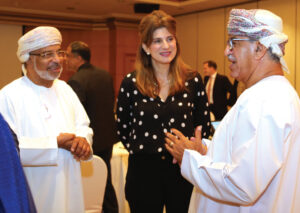HRH PRINCESS DINA MIRED
The first Arab to be elected as President to lead the largest global cancer fighting organization – The Union for International Cancer Control (UICC)
HRH PRINCESS DINA MIRED
PREVENTION IS A VERY COST-EFFECTIVE STRATEGY FOR REDUCING THE INCIDENCE OF CANCER
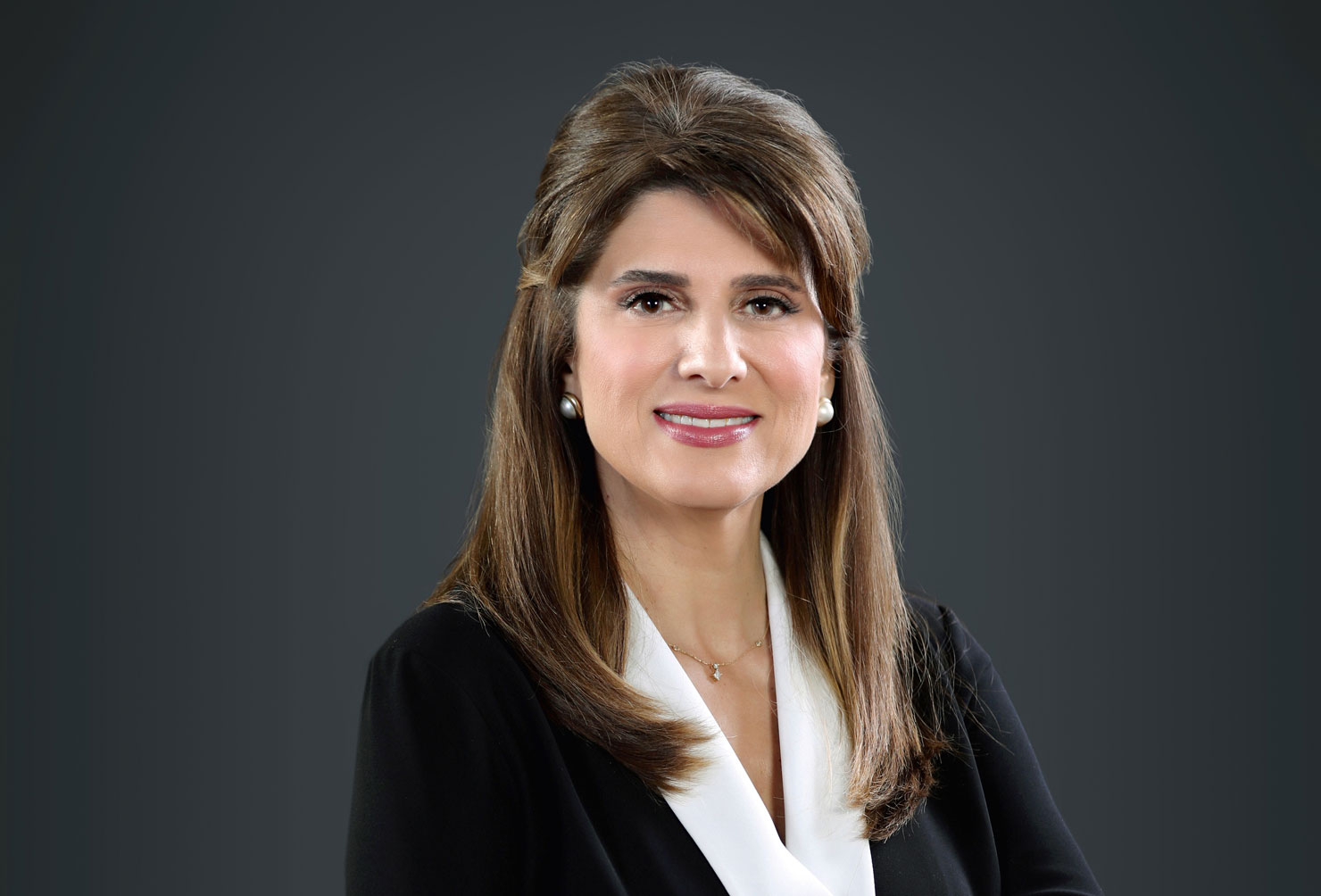
Princess Dina Mired, President of the Union for International Cancer Control (UICC) for the term 2018-2020 the first Jordanian, Arab, and non-medical professional to have achieved this honor. ‘Hospitals’ Magazine had the chance to meet with HRH Princess Dina Mired.
Congratulations on your election as President of UICC for the term 2018-2020. As the first Arab and non-medical professional to have achieved this honor, what is the significance of this achievement?
I am both humbled and honoured to have been the first Jordanian, Arab, and non-medical professional to have been elected to be the President of the Union for International Cancer Control (UICC) for the 2018-2020 term.
UICC is the largest global organization solely dedicated to reducing the global cancer burden, promoting greater equity, and integrating cancer control into the world health and development agenda. It is comprised of over 1133 organizations from 177 countries, making it the largest cancer-fighting organization in the world.
As a well-known global advocate for cancer control and non-communicable diseases, you have also represented civil society as a keynote speaker at the United Nations High-level Meetings. Can you tell us more about that?

In 2011, I was honoured to have been chosen to deliver the keynote speech on behalf of civil society at the first-ever United Nations High-level Meeting on non-communicable diseases (NCDs). Then, in 2018, I was chosen again to speak at the third High-level Meeting on NCDs as “Eminent Champion of the fight against Non-communicable diseases” on the prevention and control of NCDs including cancer.
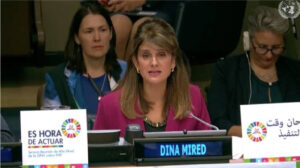
At those meetings, I called on world leaders to take urgent action on critical concerns about NCDs – including cancer, heart disease, diabetes, and chronic respiratory illnesses – which are responsible for more global deaths than all other causes combined.
Your Highness, you have been a trailblazing force behind the King Hussein Cancer Foundation in Jordan, serving as Director-General for fourteen years and transforming the non-profit into an internationally known leader in the global movement for people affected by cancer. What were your greatest obstacles and your greatest achievements?
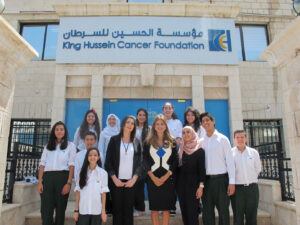
In 2002, when I became Director-General of the Foundation, people did not utter the word cancer, calling it “that disease.” The stigma was so great that even our cancer hospital at the time omitted the word cancer from its name, calling it the “Hope Center.” I would say that the greatest achievement was that I was part of the team that helped transform our cancer hospital into an internationally accredited comprehensive cancer center- The King Hussein Cancer Center. As you can see, the name now boasts the word “Cancer” right in the middle of its name, not as a message of fear but of real hope.
The King Hussein Cancer Foundation’s role was crucial in that it ignited grass-root action across all the community both locally and internationally to fundraise and support the lifesaving journey of our center, thus raising $360 million from 2002-2016. Thanks to this monumental effort from all our donors and supporters, we managed to build our much-needed two-tower expansion now named “King Salman Bin Abdulaziz” inpatient tower and “Sheikh Khalifa Bin Zayed Al Nahyan” outpatient tower. KHCF is now an internationally known brand and leader in the development, advocacy, public awareness on early detection and prevention, cancer coverage and patient support. KHCF became a role model not only in Jordan but also in the global movement for people affected by cancer.
You have been a recipient of prestigious global awards for your Achievements in Global Leadership in Cancer Control.

I am honoured to have been recognized by various global organizations for my work in cancer control. This includes the 2015 Medal of Honor from the International Agency for Research on Cancer (IARC) , Arab Woman of the Year 2018 from the London Arabia Organization, and, most recently, the Patient Advocate Award from the American Society for Clinical Pathology. I was also awarded two honorary doctorates from Yerevan State Medical University (YSMU) in Armenia, and Medical University of Asuncion-Paraguay.
Despite significant advances in cancer treatment and care, global cancer statistics still talk about cancer and other non-communicable diseases leading to global deaths. What are the reasons for this?

Cancer is still the second leading cause of death globally, accounting for an estimated 9.6 million deaths, or one in six deaths, in 2018. 70% of those deaths occur in low- and middle-income countries (LMICs).
Many health systems in low- and middle-income countries (LMICs) are not well prepared to manage the cancer burden in addition to other non-communicable diseases.
Therefore, many patients cannot access lifesaving treatment, either due to lack of facilities, lack of finances, or lack of awareness of symptoms and signs. So, many do not get their rightful chance for treatment, and if they do, either it is not qualitative treatment, or they present late when the chances for a cure are extremely slim.
Therefore, millions of patients suffer and die unnecessarily from cancers that could be treated or even cured if detected earlier. In countries where health systems are strong, survival rates are improving thanks to a number of encouraging developments in cancer research, more effective early detection, personalized treatment approaches for many different cancer types, and better care for cancer patients.
What are the short- and long-term solutions for reducing the global cancer burden?
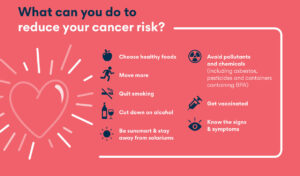
We know that 30-50% of all cancer cases are preventable. This means that prevention is a very cost-effective strategy for reducing the incidence and control of cancer.
A lot still needs to be done to increase awareness of cancer risk factors.
UICC recently conducted a global poll in 20 different countries and found out that irrespective of where people live in the world, those surveyed with a lower education and those on lower incomes are less aware of the main risk factors associated with cancer and are less likely to proactively take the steps needed to reduce their cancer risk than those from a high-income household or with a university education.
Governments should, therefore, implement national policies and programs to raise awareness, to reduce exposure to cancer risk factors, and to ensure that people are provided with the information and support they need to adopt the so-called “healthy lifestyles”.
“Lifestyle” changes, as they are so-called, give the impression that it is a matter of choice or preference. But when unhealthy foods are more affordable than the healthy when tobacco that kills is so easily available, and when facilities or space for exercise are non-existent, it becomes not a lifestyle choice, but a life sentence.
Therefore, governments have to provide an enabling environment for people to be able to follow a healthy lifestyle. The onus of responsibility, therefore, falls on both the government and the individual.
Specifically, what about the role of tobacco? How effective is tobacco control in reducing the cancer burden?
We could prevent up to 22% of cancer deaths globally by fighting tobacco alone. There are clear and evidenced-based recommendations set by the WHO MPOWER framework, and countries have committed to taking action under the Framework Convention on Tobacco Control (FCTC). This does not require money but requires political will and commitment to implementing every single line of these recommendations.
This includes increasing the price and taxes on all tobacco products to more than 75% of the retail price, creating smoke-free public places, as well as facilitating cessation programs. Countries that are doing so are starting to see declines in the incidence of disease related to tobacco.
From your global experience, what other measures countries have taken to protect the public from risk factors other than tobacco?
Other countries implemented taxes on sugar-sweetened beverages, alcohol, and other products that are harmful to our health.
Taxing the products that harm us provides a triple win. It reduces the avalanche of new cancer cases, saves future treatment costs, and at the same time, offers new revenues for the budget for health and wellbeing.
The investment case for implementing the WHO “best buys” has shown that by investing 1.7 dollars per person per year on a set of interventions to prevent and manage NCDs in LMICs, will yield a return of at least 7 dollars per person by 2030, and a 15% reduction on premature mortality from cancer and other NCDs. All in all, a comprehensive approach that promotes prevention, early detection, effective treatment, and pain control is critical to saving lives and alleviating needless suffering.
What is the status of cancer in our region?

According to the latest statistics from the International Agency for Research on Cancer (IARC) through Globocan 2018, in our EMRO region, which spans 22 countries, we see an estimated 676,508 new cancer cases each year. Leading cancers regionally for both sexes are:
- Breast 17.7% (or 119,985 cases per year)
- Colorectal 6.5% (or 43,793 cases per year)
- Lung 6.3 % (or 42,942 cases per year)
The mortality rate is over 60% reaching 418,955 cases. The tragic issue is that 40% of those cancers could have been prevented, and a further 30% could have been cured if detected early. The reality is that the majority of cancer cases in our region are diagnosed late when treatments are less effective, more expensive, and have greater side effects.
We have an opportunity to save the lives of millions of people, especially for the fact that our leading cancers are amenable to early detection (breast and colorectal), and to prevention (lung cancer). In fact, 90% of lung cancer is directly attributable to tobacco.
Our region, in particular, suffers tremendously from the scourge of tobacco products, especially cigarettes, shisha and now E cigarettes and other new products. Tobacco is associated with 7.2 million deaths, of the estimated 15 million NCD deaths annually. Governments need to take the necessary steps to fight tobacco to protect their citizens, especially young people.
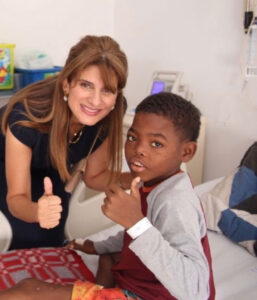
Therefore, if governments do not take firm action on controlling risk factors are known to cause cancer such as tobacco, sugar, lack of physical exercise as well as controlling exposure to other environmental carcinogenic chemicals, our region is set to experience the highest increase of cancer incidence of all WHO regions, with a projected doubling of cancer cases by 2030. We know what needs to be done; we just need to get it done.
What are UICC’s efforts in raising health awareness?
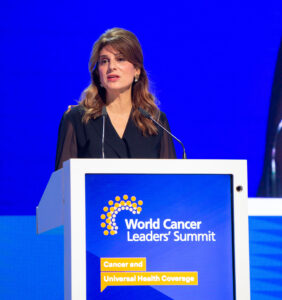

We at UICC through our extensive membership, as well as our strategic partners, work on multiple fronts: raising awareness for governments, policymakers, and the public. We utilize our global platforms such as World Cancer Day and our Global Cancer Leaders’ Summit and Congress. World Cancer Day, which is spearheaded by UICC, takes place every year on 4 February to unite global initiatives under which the world comes together to raise the profile of cancer in a positive and inspiring way.
The day aims to save millions of lives each year by raising awareness and improving education about the disease while calling for action from governments and individuals across the world. Our region participated extensively in this World Cancer Day, with many lighting up their famous monuments such as Petra, The Torch of Qatar, AUB medical center and others.
The UICC World Cancer Leaders’ Summit and Congress are excellent high-level platforms that enable us to call upon world leaders, governments and policymakers to ensure that the public receives the latest information about cancer risks and prevention measures, as well as and urging governments to establish and implement costed cancer control plans.
How far are we from reaching an effective treatment of cancer / is there an end of cancer in sight?

The knowledge of cancer has greatly improved in the last two decades. Researchers have found significant differences between not only different types of cancer but also between patients with the same type of cancer. It seems increasingly clear that there won’t be a single ‘cure’; rather, each patient will be treated according to their specific needs. New approaches are being developed that help the immune system identify and attack tumors; a field is known as immuno-oncology.
Personalized vaccines, cell therapy, gene editing, and microbiome treatments are technologies that have serious potential to change the way cancer is treated. Most of these new technologies still have to prove their effectiveness in clinical trials. Even in the best-case scenario, it will be several years until they are available. However, we are on track to reach a future where cancer treatment is personalized, and the chances of beating the disease are higher than ever. However, the global cancer burden can only be tackled if the right systems are in place to ensure that everyone has access to timely and quality cancer treatment and care, regardless of how much money you have or where you live. This also requires investing in better prevention and screening programs.
In 2019, we saw leaders around the world adopt a political declaration to support Universal Health Coverage (UHC) and make a real commitment to increasing spending on health, which will hopefully see a greater focus placed on investment in cancer control.
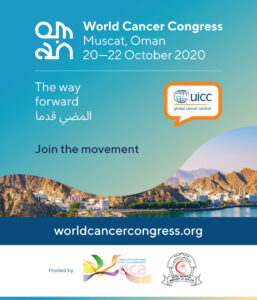

UICC is holding its first-ever global Cancer Congress in the Middle East Region in Muscat Oman on October 20-22, 2020. What is the importance of this event?
The World Cancer Congress is an award-winning global conference organized by UICC, which encourages effective knowledge transfer, and best practices exchange amongst over 3,500 cancer control and public health experts from 130 countries.
It aims to strengthen the participants’ actions and impact on national, regional, and international scales through a multidisciplinary program that features the latest successful interventions in cancer prevention, diagnosis, treatment, and care.
It will be the first time that the Congress is held in our region. Under the theme ‘The way forward’, it aims to highlight the need for the region and other parts of the world to work towards reducing the burden of cancer.
The 2020 edition of the Congress is hosted by the Oman Cancer Association (OCA) and the National Oncology Centre, Royal Hospital Muscat. It will take place in the Oman Convention and Exhibition Center.

What are the main themes highlighted at the World Cancer Congress in Oman?
The 2020 World Cancer Congress offers a truly thrilling program of activities and events with brand-new and innovative features. The program will be split across nine theme rooms allowing you to take a deep dive into a wide range of topics covering the entire cancer control spectrum. It will provide the opportunity to come face-to-face with cutting-edge ideas presented on the Spotlight Stage. You will also have the chance to hear from field experts in our dedicated space for physicians, entitled ‘International Clinical Oncology Update.’
Stakeholders from the entire cancer control spectrum, health ministers, mayors, finance ministers, oncologists, representatives from NGOs, patient groups, universities, and the private sector will engage in debates and conversations about public health and cancer issues.
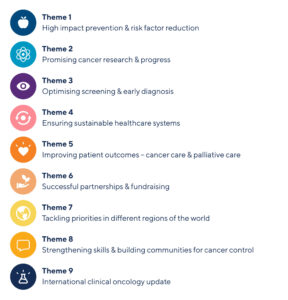

How will participants from our region benefit from attending the World Cancer Congress? Can you be more specific?
This is a golden opportunity for us in the region to benefit from both the expertise and experience from the wealth of knowledge that these events bring together all under one roof.
Rich Networking opportunities
The participants will have the chance to connect with global leaders, experts, and other organizations, sharing experiences, and learnings. Also, it is also an opportunity for us in the region to showcase the successful work that we as a region have also achieved in cancer control. The networking opportunity is so rich.
Capacity Building and Training opportunities
Most importantly, participants and organizations will also benefit from unique capacity building and training opportunities to strengthen and increase their impact.
There will be over 100 interactive sessions on cancer prevention, diagnosis, treatment and care, governance, fundraising, and leadership. There are also Master Courses to acquire specialized knowledge in a specific area of cancer control, programs for CEOs, and other learning opportunities in the lead up to and during the Congress.
The Congress will bring everyone to the table to share their experiences and views on what works and what does not is incredibly enriching for everyone. Participants of previous Congresses have told us how much they learned and appreciated the exchanges and the networking among experts.
